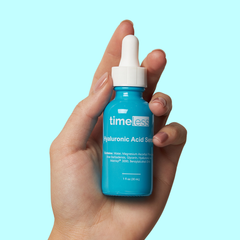They say everything in nature is about balance, and that is no less true when it comes to our skin. Achieving the delicate ying and yang of beautiful skin may come down to maintaining the right pH balance. So, what is the magic pH level of healthy skin? On a scale of 0 to 14, the ideal state is slightly acidic, sitting around 5.
Why does the skin’s pH matter?
pH stands for ‘potential hydrogen’ and measures how much alkaline or acid is in a substance. The reason our skin is slightly more acidic is thanks to a fine protective layer on its surface, called the ‘acid mantle’. Think of the skin as mixing up a protective cocktail made from fatty acids from the sebaceous glands (sebum) combined with amino and lactic acids from sweat. This creates an acidic barrier that protects our skin from bacteria, viruses and other pollutants. If the acid mantle is out of harmony or weak, it could lead to an array of skin problems.
What is the connection between Clean Eating and the pH of Healthy Skin?
The acid mantle can be affected from the inside out, through diet and maintaining a healthy digestive system. For example, too much sugar or dairy products can increase your body’s production of sebum, which can disrupt the pH balance. Both dairy and meat fall on the acidic side, and eating too much can increase inflammation. Meanwhile, a balanced diet with lots of alkaline-promoting foods such as fruits, vegetables, nuts and legumes helps your body fight off diseases.
Boosting a healthy gut by taking prebiotics and probiotics (cue the popularity of kombucha and kimchi) is also connected to healthy, resilient skin, especially when it comes to healing eczema, rosacea, and acne.
What pH Should Your Face Wash Be?
What products we use can also affect the pH level of healthy skin. Have you ever wondered why some cleansers give your skin that squeaky-clean tight feeling? They could be disrupting your skin’s pH level. Choose soap-free cleansers that are pH balanced (not too alkaline or too acidic) that fall within the range of normal, healthy skin.
If they’re not used properly, acidic products such as AHAs can temporarily disrupt the moisture barrier by over-stripping the skin’s natural oils and actually exacerbate acne-prone skin. Other possible offenders for irritating your skin could be fragrances, essential oils or foaming agents like sodium lauryl sulfate. These are common ingredients in skincare products that could be disrupting your skin’s acid mantle.
When in doubt over what is causing your skin to act out, perhaps the easiest thing is to do less, not more! Sometimes just using a curated selection of simple products can help your skin balance its pH level, and might just be the key to achieving beautifully balanced, glowing skin.
Shelly, Timeless Skin Care Esthetician adds:
“The takeaway is this: balance. Choose products that are pH balanced or products formulated with a pH that falls in the same range as the skin’s natural barrier. Avoid consistently disrupting the pH levels in the skin, allowing the skin to naturally regulate itself so as to prevent breakouts, irritation and inflammation.”
Highly acidic, Vitamin C absorbs readily into the skin. The most bioavailable and potent form of Vitamin C is L-Ascorbic Acid, such as 20% Vitamin C + E Ferulic Acid Serum with a pH level of approximately 2.4.
For those with more sensitive skin, we recommend Hyaluronic Vitamin C Serum which contains magnesium ascorbyl phosphate, a less potent derivative of Vitamin C that still works to brighten and protect.
The delicate and sensitive eye area is prone to dryness and one of the first areas to show signs of aging. Try Hydrating Eye Cream to keep it well hydrated.
A concentrated, active polypeptide serum, such as Matrixyl® Synthe'6® works on the deeper layers of the skin to heal and regenerate.
Hyaluronic Acid Pure is incredibly effective for plumping and delivering moisture to the skin while also being very light. It doesn’t clog up pores and can be applied alone directly on to damp skin OR follow the application of other serums for added moisturizing benefits.DISCLAIMER: The information on our blogs has been compiled from published sources and the experience of the Timeless Skin Care team. The blogs are not intended to diagnose or treat a medical condition or to address every skin type or condition. While reasonable effort is made to publish reliable and up to date information, Timeless Skin Care cannot predict how a skin care regimen will affect every individual user. Timeless does not guarantee any specific outcomes or the accuracy of all information presented and accepts no liability in respect of any omission or error. If you are uncertain about possible sensitivity when using Timeless Skin Care products, please do a patch test before use. If you have any skin concerns, please talk to your physician or consult a dermatologist.



















